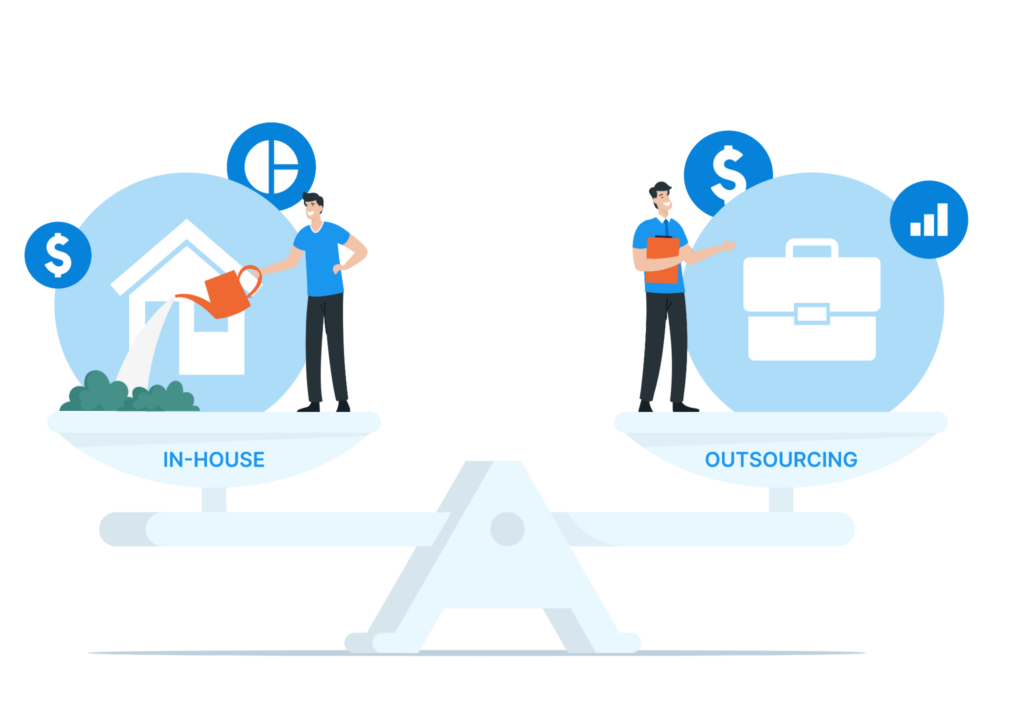In the competitive landscape of today’s business world, marketing plays a pivotal role in propelling small businesses toward success. However, managing effective marketing campaigns requires specialized skills, resources, and time that small businesses often lack. This is where outsourcing marketing steps in as a strategic solution.
In this guide, we’ll delve into the significance of marketing for small businesses. We will explore the nuances between outsourced and in-house marketing and dissect the advantages and drawbacks of outsourcing. We will also provide you with crucial considerations for choosing your business.
Why Is Marketing Important for Small Businesses
Marketing is the lifeblood of any business, irrespective of size. For small businesses, it is the driving force that boosts brand visibility, attracts potential customers, and converts leads into loyal patrons. A well-crafted marketing strategy not only establishes your presence in the market but also differentiates you from your competitors. It allows you to convey your unique value proposition and build lasting relationships with your audience. Practical marketing efforts enable businesses to:
- Build Brand Awareness: Marketing helps small businesses carve a distinct identity in the minds of their target audience, fostering brand recognition and loyalty.
- Attract Customers: Engaging marketing campaigns drive potential customers towards your business, increasing leads and sales opportunities.
- Stay Competitive: In a fast-paced world, marketing keeps your small business in the spotlight, ensuring you remain competitive.
- Tell Your Story: Marketing allows you to share your business’s unique story and values, connecting personally with your audience.
Difference Between Outsourced Marketing vs. In-House Marketing

Choosing between in-house and outsourced marketing is a significant decision that requires careful consideration.
- In-House Marketing: In-house marketing involves assembling a dedicated team within your organization to handle all marketing activities. This option offers control over strategy and execution but may be limited by your team’s expertise and capacity.
- Outsourced Marketing: Outsourcing marketing involves hiring external professionals or agencies to manage your marketing efforts. This approach grants access to a pool of experts while allowing you to focus on core business activities.
Reasons You Should Outsource Marketing for Your Small Business
Outsourcing marketing for your small business can offer numerous advantages, contributing to growth, efficiency, and cost-effectiveness. Here are some compelling reasons to consider outsourcing your marketing efforts:
- Access to Expertise: Marketing agencies specialize in various aspects of marketing, from digital strategies to content creation and analytics. Outsourcing gives you access to a team of professionals with diverse skills and industry knowledge that might be too expensive to hire in-house.
- Cost Savings: Employing an entire in-house marketing team with salaries, benefits, and overhead costs can financially burden small businesses. Outsourcing allows you to pay for services only when needed, reducing fixed expenses.
- Focus on Core Competencies: Outsourcing marketing frees up your time and resources to focus on what you do best – running your business. It eliminates the need to divert energy away from your core operations.
- Scalability: As your business grows, your marketing needs will evolve. Outsourcing provides the flexibility to scale your marketing efforts up or down without the logistical challenges of hiring and training new employees.
- Fresh Perspective: An external marketing team brings an outsider’s perspective to your business. They can identify strengths, weaknesses, and opportunities that may need to be apparent to an internal team.
- Quick Implementation: Marketing agencies are equipped to start campaigns swiftly, saving you the time it takes to recruit and train an in-house team. This is particularly beneficial when you need to respond to market changes promptly.
- Diverse Skill Set: Marketing agencies often comprise experts in various domains – graphic design, content creation, SEO, social media, and more. This diversity ensures a comprehensive approach to your marketing efforts.
Outsourcing marketing empowers small businesses to access high-quality marketing services, benefit from expert insights, and optimize their marketing strategies without the overhead costs associated with in-house teams. It’s a strategic move that can significantly contribute to your business’s success and growth.
Disadvantages of Outsourcing Marketing
- Less Control: Outsourcing means relinquishing some control over your marketing initiatives. Collaborative communication ensures your vision aligns with the agency’s execution.
- Communication Challenges: Distance might lead to miscommunication or delays in feedback, so clear communication channels are essential.
- Less Immediate Response: With an in-house team, addressing urgent needs is often quicker. Outsourced agencies might have other clients to manage, affecting immediate response times.
Things to Consider When Outsourcing Marketing for Your Small Business
- Cost: Outsourcing comes with a price tag. Consider the cost of your budget and the potential ROI.
- Evaluating Consultants or Agencies: Research potential partners thoroughly. Check their track record, read reviews, and request case studies to ensure their expertise meets your needs.
- Measuring Impact: Define key performance indicators (KPIs) and establish a system to measure the success of your campaigns, ensuring that your investment yields tangible results.
- Developing the Scope of Work: Clearly outline the scope of work, including deliverables, timelines, and expectations, to avoid misunderstandings.
When Should You Transition From Outsourced to In-House Marketing?
Transitioning from outsourced to in-house marketing is a strategic decision that depends on various factors unique to your business. Here are key indicators that can signal it’s time to consider making the shift:
- Consistency and Control: If you find maintaining consistent brand messaging and control over your marketing efforts challenging with an outsourced agency, it might be time to consider in-house. Bringing your marketing operations in-house can provide greater control over campaigns, content, and strategies.
- Cost Efficiency: Consider the latter if outsourcing becomes comparable to building an in-house team. With an in-house team, you have dedicated resources and expertise without ongoing agency fees.
- Sensitive Information: If your marketing strategies involve proprietary or sensitive information you prefer to keep in-house, transitioning to an in-house team could enhance security and confidentiality.
- Cultural Alignment: Building an in-house team allows you to foster a marketing culture that aligns directly with your company’s values, vision, and goals.
- Long-Term Investment: If you foresee marketing as a core component of your long-term strategy, investing in building an in-house team can lead to more profound expertise and more substantial brand alignment over time.
However, transitioning to an in-house team is challenging. You’ll need to consider hiring, training, and the time it takes to build a cohesive team. Ultimately, transitioning from outsourced to in-house marketing should be based on carefully evaluating your business’s unique needs, goals, and resources. A hybrid approach, where you maintain some outsourced services while gradually building an in-house team, can also be an effective strategy to ensure a seamless transition while retaining the benefits of both approaches.
In conclusion, the decision to outsource marketing for your small business is strategic. Weigh the advantages, disadvantages, and considerations to ensure you make an informed choice that aligns with your goals and resources. Effective marketing, whether outsourced or in-house, will continue to drive your small business toward growth and success.








